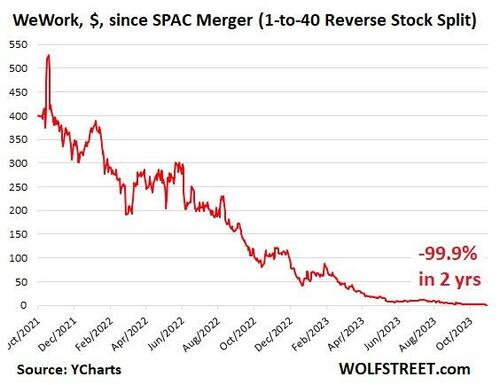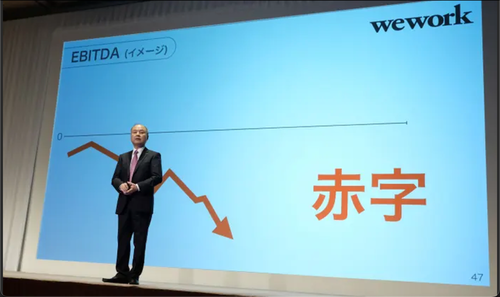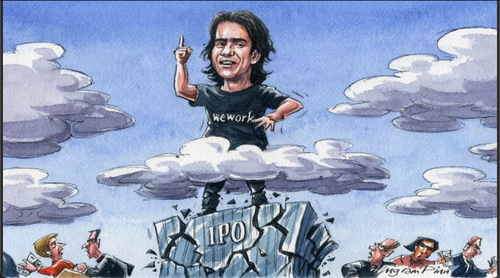
Update (1110ET):
Manhattan's largest private office lessee, WeWork, has collapsed into bankruptcy. Court papers indicate plans to abandon dozens of office lease agreements across the metropolitan area, which might worsen the commercial real estate crisis.
According to Bloomberg, "Dormant locations in New York dominate a list of nearly 70 leases the coworking giant intends to terminate, court papers show. The roughly 40 contracts at issue include space near Union Square and in Fulton Center, a retail and transit facility in downtown Manhattan."
Bankrupt WeWork to Immediately Dump 40 NYC Office Leases: BBG
— zerohedge (@zerohedge) November 7, 2023
The proverbial straw that broke the CREmel's back.
Court papers said the leases are "limited to no benefit" to the company and are primarily dormant space.
Buildings vacated by WeWork might ripple through an already weakened CRE market because the coworking startup is an anchor tenant for numerous buildings that account for "about $2.6 billion in CMBS debt, with about half of those loans reaching maturity within the next 12 months," according to real estate news website Commercial Observer. Already, 80% of those landlords are on a special servicing watchlist, delinquent on their loans, and or in default, according to CMBS data firm Trepp.
WeWork's collapse, accompanied by the termination of dozens of leases, is poised to cause even more strain for building owners grappling with the tightest borrowing conditions in years.
As of June 2022, the company rented nearly 20 million square feet of office space across the US. And what's happening in NYC is coming to a city near you.
Weeks ago, Scott Rechler, Chairman and CEO of RXR Realty, warned the CRE crisis was just getting starting...
* * *
Almost exactly two years after going public via SPAC, WeWork, the struggling co-working start-up that once held a valuation as high as $47 billion, filed for Chapter 11 bankruptcy protection in New Jersey federal court Monday, having, as Wolf Richter reports, spent its entire life burning huge amounts of cash raised from investors – a total of $13.8 billion raised in 22 rounds, much of it from SoftBank and SoftBank’s Vision fund.
In a press release, the company said it struck a "Restructuring Support Agreement" with creditors to "drastically" reduce the company's "existing funded debt and expedite the restructuring process."
The bankruptcy is limited to only WeWork's locations in the US and Canada, the company said. It reported liabilities ranging between $10 billion to $50 billion.
"Now is the time for us to pull the future forward by aggressively addressing our legacy leases and dramatically improving our balance sheet," WeWork CEO David Tolley said in a press release.
Tolley continued, "I am deeply grateful for the support of our financial stakeholders as we work together to strengthen our capital structure and expedite this process through the Restructuring Support Agreement."
In recent months, WeWork provided numerous signals of its imminent demise.
The first was in August, when it stated in a 10-Q filing that "substantial doubt exists about the company's ability to continue as a going concern."
As the company hemorrhaged cash and liquidity was running thin, Tolley said in September that the company "would seek to negotiate terms with our landlords" and "part of these negotiations, we expect to exit unfit and underperforming locations and to reinvest in our strongest assets as we continuously improve our product."
Then, in early October, WeWork skipped interest payments totaling $95 million on five of its bonds, which triggered a 30-day grace period.
As of June, the company was leasing 20 million square feet of office space, more than any other company in the US. This also comes as the office market is in a severe downturn due to remote and hybrid work trends, plus companies are panic exiting imploding progressive metro cities for safer areas.
In 2019, WeWork was valued at $47 billion in a round led by Masayoshi Son's SoftBank. The company attempted to go public but miserably failed.
Despite the bankruptcy, Financial Times quoted WeWork as saying its office spaces were still "open and operational."
Adam Neumann, the founder of WeWork, issued a statement on Monday ahead of the bankruptcy that said the impending news was "disappointing." Remember, Neumann once said he aspired to be the world's first trillionaire.
WeWork might come out of bankruptcy with a much smaller office footprint across North America. This scenario could spell trouble for the already struggling office space market, potentially unleashing a wave of additional supply.
Update (1110ET):
Manhattan’s largest private office lessee, WeWork, has collapsed into bankruptcy. Court papers indicate plans to abandon dozens of office lease agreements across the metropolitan area, which might worsen the commercial real estate crisis.
According to Bloomberg, “Dormant locations in New York dominate a list of nearly 70 leases the coworking giant intends to terminate, court papers show. The roughly 40 contracts at issue include space near Union Square and in Fulton Center, a retail and transit facility in downtown Manhattan.”
Bankrupt WeWork to Immediately Dump 40 NYC Office Leases: BBG
The proverbial straw that broke the CREmel’s back.
— zerohedge (@zerohedge) November 7, 2023
Court papers said the leases are “limited to no benefit” to the company and are primarily dormant space.
Buildings vacated by WeWork might ripple through an already weakened CRE market because the coworking startup is an anchor tenant for numerous buildings that account for “about $2.6 billion in CMBS debt, with about half of those loans reaching maturity within the next 12 months,” according to real estate news website Commercial Observer. Already, 80% of those landlords are on a special servicing watchlist, delinquent on their loans, and or in default, according to CMBS data firm Trepp.
WeWork’s collapse, accompanied by the termination of dozens of leases, is poised to cause even more strain for building owners grappling with the tightest borrowing conditions in years.
As of June 2022, the company rented nearly 20 million square feet of office space across the US. And what’s happening in NYC is coming to a city near you.
Weeks ago, Scott Rechler, Chairman and CEO of RXR Realty, warned the CRE crisis was just getting starting…
* * *
Almost exactly two years after going public via SPAC, WeWork, the struggling co-working start-up that once held a valuation as high as $47 billion, filed for Chapter 11 bankruptcy protection in New Jersey federal court Monday, having, as Wolf Richter reports, spent its entire life burning huge amounts of cash raised from investors – a total of $13.8 billion raised in 22 rounds, much of it from SoftBank and SoftBank’s Vision fund.
In a press release, the company said it struck a “Restructuring Support Agreement” with creditors to “drastically” reduce the company’s “existing funded debt and expedite the restructuring process.”
The bankruptcy is limited to only WeWork’s locations in the US and Canada, the company said. It reported liabilities ranging between $10 billion to $50 billion.
“Now is the time for us to pull the future forward by aggressively addressing our legacy leases and dramatically improving our balance sheet,” WeWork CEO David Tolley said in a press release.
Tolley continued, “I am deeply grateful for the support of our financial stakeholders as we work together to strengthen our capital structure and expedite this process through the Restructuring Support Agreement.”
In recent months, WeWork provided numerous signals of its imminent demise.
The first was in August, when it stated in a 10-Q filing that “substantial doubt exists about the company’s ability to continue as a going concern.”
As the company hemorrhaged cash and liquidity was running thin, Tolley said in September that the company “would seek to negotiate terms with our landlords” and “part of these negotiations, we expect to exit unfit and underperforming locations and to reinvest in our strongest assets as we continuously improve our product.”
Then, in early October, WeWork skipped interest payments totaling $95 million on five of its bonds, which triggered a 30-day grace period.
As of June, the company was leasing 20 million square feet of office space, more than any other company in the US. This also comes as the office market is in a severe downturn due to remote and hybrid work trends, plus companies are panic exiting imploding progressive metro cities for safer areas.
In 2019, WeWork was valued at $47 billion in a round led by Masayoshi Son’s SoftBank. The company attempted to go public but miserably failed.
Despite the bankruptcy, Financial Times quoted WeWork as saying its office spaces were still “open and operational.”
Adam Neumann, the founder of WeWork, issued a statement on Monday ahead of the bankruptcy that said the impending news was “disappointing.” Remember, Neumann once said he aspired to be the world’s first trillionaire.
WeWork might come out of bankruptcy with a much smaller office footprint across North America. This scenario could spell trouble for the already struggling office space market, potentially unleashing a wave of additional supply.
Loading…







